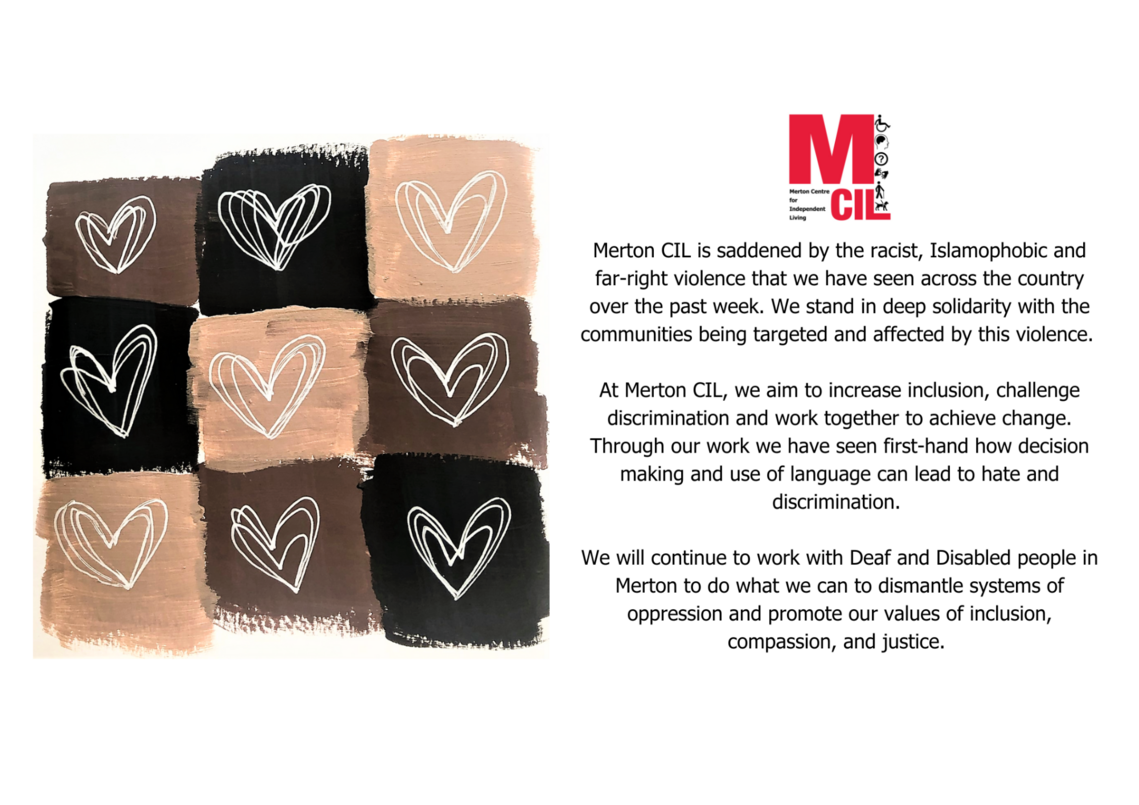Merton CIL is saddened by the racist, Islamophobic and far-right violence that we have seen across the country over the past week. We stand in deep solidarity with the communities being targeted and affected by this violence.
At Merton CIL, we aim to increase inclusion, challenge discrimination and work together to achieve change. Through our work we have seen first-hand how decision making and use of language, can lead to hate and discrimination.
We will continue to work with Deaf and Disabled people in Merton to do what we can to dismantle systems of oppression and promote our values of inclusion, compassion, and justice.
You can find resources for support here.
Please also see below for some key contact details shared by MOPAC:
- If you are facing an urgent risk or immediate threat, dial 999 to report the situation to emergency services. For non-emergency situations, dial 101 to receive guidance and support from your community safety team.
Know your rights
- Migrants’ Rights Network have assembled a variety of London local resource guides to use alongside their Know Your Rights Guide in supporting migrant Londoners amid disinformation
Mental health support
- Victim Support have responded to the violence and racist attacks by offering services to those impacted. Get support through their free Supportline on 08 08 16 89 111, start a live chat, or access My Support Space—a free, online resource to help you cope following crime.
- Explore Healing Justice London’s Aftercare Menu to practice coping skills following a trauma or major event or watch their Anchoring Resilience workshop video
- Tell MAMA’s anti-Muslim hate support service provides independent, confidential advice to individuals across the UK. Reach them via phone (0800 456 1226), SMS text (0115 707 00 07), WhatsApp (0734 184 6086), or e-mail (info@tellmamauk.org) to learn more.
- The British Islamic Medical Association runs a Support Service open to BIMA members and allies, including non-clinicians in the health system. It provides legal and pastoral help to those facing threats at work relating to their Muslim identity or supporting causes such as Palestine and standing up against Islamophobia. You can email the service in confidence at support@britishima.org or call 0203 551 2497
Property safety & crime prevention
- Explore Muslim Council of Britain’s mosque security resources
- Learn more about risk management through ProtectUK’s full guide to risk management
- Read HOPE Not Hate’s guide, Staying Safe Amidst Far-Right Violence
- Read Refugee Action’s briefing for people seeking asylum in hotels.
Reporting acts of violence & hate crime
- In an emergency situation—where you feel like things could get heated or violent very soon or where someone is in immediate danger—always call 999. For individuals with a hearing or speech impairment, use the textphone service 1800 or text the Met on 999 if you’ve pre-registered with the emergencySMS service.
- Read the comprehensive guide to identifying and reporting hate crime published by Muslim Council of Britain
- You can also contact the CATCH (Communities Against Hate) Partnership for specialist advice and support.
- Get funding to enhance security at your place of worship via the Home Office's Protective Security Schemes. Thinking about applying for your Mosque, but unsure if you’d qualify? Visit Muslim Council of Britain’s comprehensive FAQ page on the scheme
- The Met’s support for victims and witnesses of a crime page can guide you through what happens if you experience or witness crime
- Inclusion London have a dedicated resource page on hate crime, with particular attention to support for deaf and disabled people’s organisations
Staying up to date
- Consider joining the VCSEP-run Community Tensions Slack channel. If you need help accessing this channel, email info@vcesp.org.uk
Talking with young Londoners about the violence
- Explore published resources by the UK Trauma Council, including a guide to responding to critical incidents for educators and those working with young people and Guidance on Creating the Best Environment for Recovery
- See British Red Cross’s guides, How to Talk to Children and Young People about Conflict and Talking with Young People about a Major Emergency

